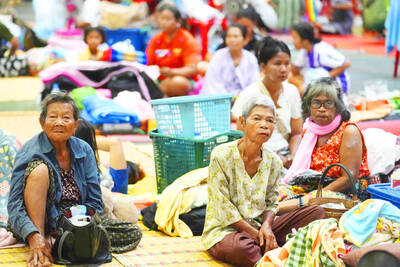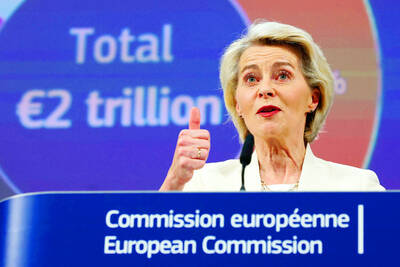Thai “red shirt” protesters raised tensions yesterday with threats to expel thousands of troops guarding Bangkok’s old city during a rally to oust Thai Prime Minister Abhisit Vejjajiva.
Tens of thousands of demonstrators seeking a new election gathered at eight points in Bangkok’s historic heart and vowed to tear down barbed-wire barricades, prompting troops to pack up and leave in a bid to avoid clashes.
“We’re at the point where this is it — this is the breaking point,” a protest leader, Nattawut Saikua, shouted to the crowd at what the protesters have called an “historic rally.”
“If we lose, we will probably go to jail; if we win, then we get a democracy back,” he said.
The fiery rhetoric represents a more confrontational approach by the movement, which backs twice-elected former prime minister Thaksin Shinawatra and has taken aim at the military and so-called bureaucratic elites it says conspired to overthrow him in 2006.
Analysts say protest leaders are facing a dilemma: either maintain their non-violent approach and fail to rattle the government, or up the ante and risk sparking clashes that could cost them their fast-growing support and credibility.
The lack of violence, combined with Abhisit’s steadfast military backing, has encouraged foreign investors lured by cheap shares with high dividend yields to pour into Thailand’s stock market in recent weeks.
On Friday, foreigners bought Thai stocks for a 24th straight session, spending a net 1.01 billion baht (US$31.2 million). They have purchased about 47 billion baht since Feb. 22 as hot money continues to flow into regional bourses.
Thai Finance Minister Korn Chatikavanij said on Friday capital inflows into the Thai bourse should continue for the foreseeable future, although any escalation in political tension could trigger outflows.
The protests highlight a deepening divide in the region’s second-biggest economy that has made investors think twice about longer-term expansion in Thailand.
Many believe the situation will only escalate, especially if a pro-Thaksin government wins the next election, as is likely. Many investors are eying other, more stable countries.
The mostly rural protesters gathered in groups of thousands outside locations that included universities, Buddhist temples and a zoo, all of which were guarded by troops empowered by a tough internal security law to keep the “red shirts” at bay.
In response to threats, the army defiantly declared its troops were going nowhere.
“It’s just not possible we will withdraw our forces,” army spokesman Sansern Kaewkamnerd told Channel 3 television.
But minutes later, soldiers at several locations took down barricades and left.
“We have adjusted our troops to a more appropriate place. We’re doing this to avoid any confrontation and to reduce the tensions,” Sansern later told Modern Nine television.
A military crackdown on protesters in Bangkok almost a year ago led to Thailand’s worst street violence in 17 years, which prompted sovereign credit ratings downgrades and earned the “red shirts” a reputation as thugs hired by Thaksin.
The army’s latest response highlights simmering tensions in Bangkok as Abhisit continues to frustrate the “red shirts” by refusing to dissolve parliament.
A small bomb exploded near the city’s customs department, far from the protest site, early yesterday, the latest in a slew of mysterious blasts and grenade attacks that have caused minimal damage but kept the city on edge.

FOREST SITE: A rescue helicopter spotted the burning fuselage of the plane in a forested area, with rescue personnel saying they saw no evidence of survivors A passenger plane carrying nearly 50 people crashed yesterday in a remote spot in Russia’s far eastern region of Amur, with no immediate signs of survivors, authorities said. The aircraft, a twin-propeller Antonov-24 operated by Angara Airlines, was headed to the town of Tynda from the city of Blagoveshchensk when it disappeared from radar at about 1pm. A rescue helicopter later spotted the burning fuselage of the plane on a forested mountain slope about 16km from Tynda. Videos published by Russian investigators showed what appeared to be columns of smoke billowing from the wreckage of the plane in a dense, forested area. Rescuers in

Philippine President Ferdinand Marcos Jr is to meet US President Donald Trump this week, hoping Manila’s status as a key Asian ally would secure a more favorable trade deal before the deadline on Friday next week. Marcos would be the first Southeast Asian leader to meet Trump in his second term. Trump has already struck trade deals with two of Manila’s regional partners, Vietnam and Indonesia, driving tough bargains in trade talks even with close allies that Washington needs to keep onside in its strategic rivalry with China. “I expect our discussions to focus on security and defense, of course, but also

POINTING FINGERS: The two countries have accused each other of firing first, with Bangkok accusing Phnom Penh of targeting civilian infrastructure, including a hospital Thai acting Prime Minister Phumtham Wechayachai yesterday warned that cross-border clashes with Cambodia that have uprooted more than 130,000 people “could develop into war,” as the countries traded deadly strikes for a second day. A long-running border dispute erupted into intense fighting with jets, artillery, tanks and ground troops on Thursday, and the UN Security Council was set to hold an emergency meeting on the crisis yesterday. A steady thump of artillery strikes could be heard from the Cambodian side of the border, where the province of Oddar Meanchey reported that one civilian — a 70-year-old man — had been killed and

‘OPPORTUNITY TO ENGAGE’: Antonio Costa and Ursula von der Leyen are to meet Chinese President Xi Jinping to discuss EU-China relations and geopolitical challenges Top leaders from China and the EU are to hold a summit in Beijing this week, as the major economic powers seek to smooth over disputes ranging from trade to the Ukraine conflict. Beijing and Brussels have been gearing up to mark the 50th anniversary of the establishment of diplomatic ties, but a suite of squabbles over state subsidies, market access and wartime sanctions have dampened the festivities. A spokesperson for the Chinese Ministry of Foreign Affairs yesterday confirmed that European Council President Antonio Costa and European Commission President Ursula von der Leyen would visit on Thursday. The statement came after the EU